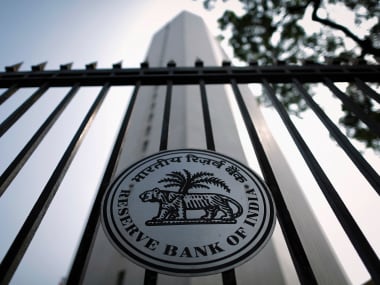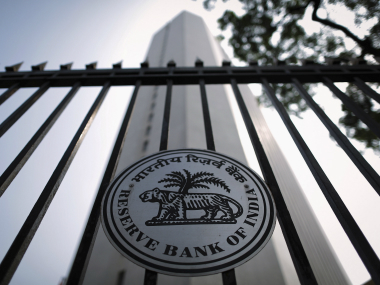This piece is in response to an article by Tarek Fatah titled ‘ RBI's idea to bring Sharia banking into the fray is deeply flawed ’, published by Firstpost on 24 November. I read Fatah’s views more than once and was trying to understand what the writer wanted to convey. Tarek seems to be completely confused. I was disappointed as I was expecting an analytical piece from him but what came across were divergent ideas with no meaning and flying in different directions. Tarek has no clue on the background work which RBI has been doing for years now with regards to comprehensively understand the practices of Islamic banking globally. The detailed study which RBI has done with respect to requirements of legal amendments to be done to allow the practices of Islamic banking is quite exhaustive. The current approach of implementation of RBI also looks thoroughly mature.[caption id=“attachment_3118062” align=“alignleft” width=“380”]  The RBI logo. Reuters[/caption] Tarek picked up two critiques of Islamic banking and quoted them copiously and seems to have believed that they are the only true voices in the field of Islamic banking. There were three conclusions of these critics, the first that the current interest practiced by banks is not prohibited by Islam but what is prohibited is usury. The difference between usury is that it is excessive and interest being nominal. But the irony is how would he explain the exorbitant interest rates on credit cards and microfinance? Will you categorise this as interest or usury? By the way, does Tarek know who in history has brought out this differentiation? This whole differentiation was brought by the 1545 Act “An Act Against Usurie” by King Henry VIII of England. No recognised Islamic Shariah scholar believes in this illogical differentiation between interest and usury. The logic presented by Tarek is like saying that controlled alcohol consumption is good and acceptable but excessive alcohol is prohibited. Any excess charged on money lent is not accepted from Shariah perspective. This is because the whole idea of currency in Islamic jurisprudence is that it is merely a unit of transaction and not an asset itself. Currency by itself cannot generate any excess currency. The currency needs to be put to action on assets to create an increment. On the other note let me quote Aristotle, one of the renowned philosophers of Greek philosophy, wrote in his 350 BC work, Politics, in Book One, Part 10, that usury is the lending of money at interest: “The most hated sort, and with the greatest reason, is usury, which makes a gain out of money itself, and not from the natural object of it. For money was intended to be used in exchange, but not to increase at interest. And this term interest, which means the birth of money from money, is applied to the breeding of money because the offspring resembles the parent. Wherefore of all modes of getting wealth this is the most unnatural.” Indian literature and movies have a strong undercurrent on ‘interest’. Let us have a look at what Munshi Premchand had to say in his short story SawaSerGehun. It has a beautiful depiction of how interest no matter how small and in whatever form can enslave an individual. Let me remind you another scene from the movie Mother India on how Sukhi Lala the money lender exploits the poor family through ‘interest’. In a nutshell the size of interest-free banking in terms of assets is $2 trillion. There are over 1,000 institutions in around 100 countries including banks, asset managers, private equity firms and insurance companies. The concentration of assets is more in the Middle East, around 46 percent and around 16 percent in South-East-Asia and the rest spread over all other countries. The terminology used for this industry includes Islamic banking, interest-free banking and participatory banking. Interest-free financing today is not just a concept but a reality which is being practiced in countries like the United Kingdom, in the West Singapore in the East and Australia is South Asia. Interest-free banking which is based on a participatory model should be allowed to function in India so that people have the option to enter into commercial transactions which are participatory in nature. A vibrant economic environment is where individuals are given options to experiment with different financial contracts. We hope to see the Indian doors open to interest-free banking concept. Let us analyse debt model. Let us give a name to debt fever and call it debtorism. The general symptoms of this fever are that initially when the first dosage of the funding is received the individual is elated and overjoyed. The desires seem to rise high in the mind. Reckless spending becomes one common side effect. Ego gets boosted and the gait becomes haughty. This fever can affect an individual, a corporate and a sovereign. When the repayment of debt is nearing, and if at all there is a gap and shortfall to repay and in cases where there is nothing to pay then the main side effect is loss of self-respect, strong feeling of humiliation (aren’t these signs of age-old slavery which we now see in modern economic slaves?. The person starts searching for places to hide, the rich could escape but the poor would hide behind the curtain of their death (the rising suicides of the debt-ridden farmers is more than sufficient to concretise this thesis). The second criticism is that the current practices of Islamic banking and finance are not truly Islamic. In fact, they are similar to interest based transactions with mere different terminologies. If this is the case then why these countries, to name a few, like the United Kingdom and Singapore had to devise new regulation for the practices of Islamic banking? And for a moment let us agree that Islamic banking is a replica for conventional banking. In that case, then why is Tarek agitated? In fact, he should be at peace as there is nothing new or different about the banking system being permitted. The third criticism is that the Islamic banking has not contributed in the poverty alleviation but the beneficiary of this has only been the bankers and the Shariah scholars. It is like saying hunger is not alleviated by restaurants but its main beneficiaries are the restaurant owners and the managers. Criticism has to be backed by logic, researched data and argument. Unfortunately, I found none in the article of Tarek. On a friendly note I would like to suggest to him that no matter how many internal differences we may have, many a times regulators in India have shown farsighted inclusiveness in their approach. And on the sidelines, I would like to humbly suggest that it would be the last thing for Indian Muslims to look for a sympathiser in Tarek. The author is a senior executive at CITI Islamic in Bahrain.
Interest-free banking which is based on a participatory model should be allowed to function in India so that people have the option to enter into commercial transactions which are participatory in nature.
Advertisement
End of Article


)

)
)
)
)
)
)
)
)



